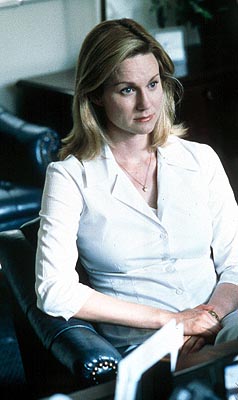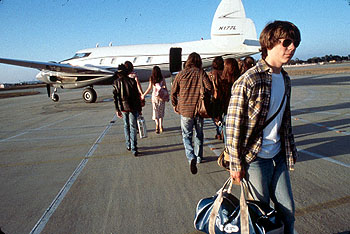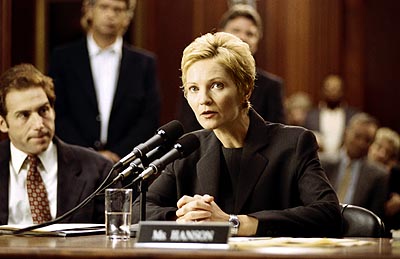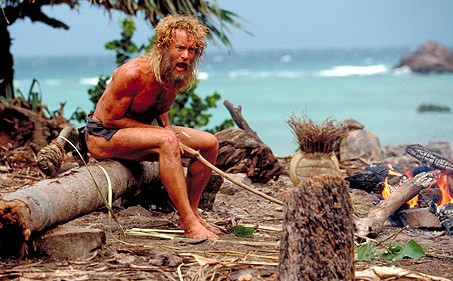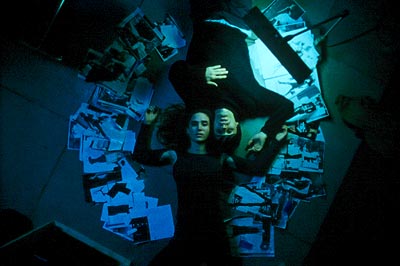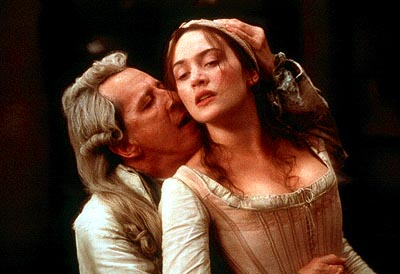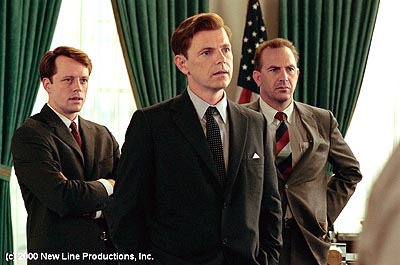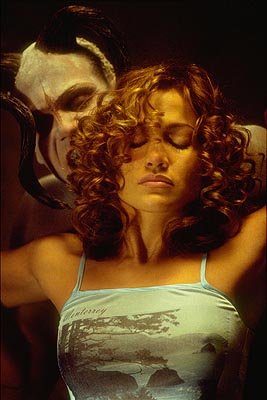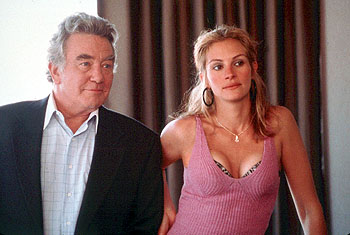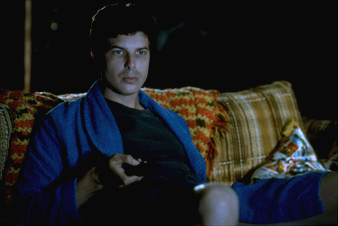|
OF 2000

In a year when so few films had the quality to overwhelm me with their power, one stood out strongly above the rest, and maybe even redeemed what was a very disappointing year in cinema. Steven Soderbergh, a darling of the independent film movement for a decade ever since his landmark film sex, lies, and videotape in 1989, worked his way steadily through the decade up to the year 2000, when he would achieve his greatest success ever with two remarkable films. Two films that bookend my top ten list in fact. The film I felt was his greatest achievement was the film I chose as the best film of the year, Traffic. Soderbergh's film is absolutely superb in its craftsmanship, so crisp in its editing, so timely and dramatic in its issues, so honest in its portrayals -- the film at once overwhelms you with its complexity of narrative while at the same time thoroughly engrossing you in different stories which weave in and out of each other. Traffic interweaves three different stories seamlessly, all showing different parts of the drug war in contemporary America and Mexico. One of the most brilliant aspects of this film is how Soderbergh uses three different stories, each compelling in their own right, to show the different parts of the drug trade, and how futile the battle to stop the drugs is. One story involves the corruption in Mexico, and the border patrol cop who's caught in between doing right between two rival factions of drug cartels. Benicio Del Toro gives an extraordinary performance as this man, and in these scenes, shot in hot, yellow tones, we see the drug trade at its highest level, as the drugs are sold into the United States. A second story follows the arrest of a drug kingpin in America, and the wife left behind, played by Catherine Zeta-Jones, who must first discover what business her husband was truly in, and then surprisingly, in an act of family preservation and love, takes over the business, and perhaps becomes more ruthless than her husband ever was. Two undercover cops, played by Don Cheadle and Luis Guzman, follow her in an attempt to stop this particular drug cartel running in America. Perhaps the most compelling of the three stories involves the drug trade at its "final" level ... those who purchase the drugs and use them, which unfortunately is our own kids. Michael Douglas plays Robert Wakefield, who at the beginning of the film has been hand selected by the President to be the new drug czar, trying to come up with new ways to stem the drug problem in America. In several scenes, we see how the politicians really don't seem to care whether anything is really done about the drug problem, just as long as it looks like they're doing something about it. Wakefield's daughter, meanwhile, is doing serious drugs with her friends, and we endure her descent into further drug use and further desperation. Wakefield eventually discovers her daughter's secret, and must concentrate his fight against drugs against his own daughter. These are truly some of the most powerful scenes in the film, especially when his daughter submits herself to further acts of desperation to get the drugs, even to sleeping with the man who supplies them. Wakefield travels downtown to some very scary areas to try to save his daughter at the risk of losing his own. Soderbergh interweaves these powerful stories with such skill. The viewer never feels lost, and even though the stories don't completely come together by the end, they are united by their clear intent to show the futility and reality of the drug problem as it exists today, and also by the end, they also have hope that something can still be done to stop the drugs. Soderbergh never takes a stand in the film. He simply presents the different issues, uses some of his characters to bring up some of the problems with the war against drugs in America today, and does all this in one of the most compelling and accomplished films of recent times. I loved Soderbergh's visual style in this film ... the Mexico scenes are all filmed in a grainy yellow, while California is filmed in a muted tan. Ohio and Washington, DC, are presented in a steel blue color ... it's a unique style, and also serves to tell the stories apart. I think the greatest success of this film however is in the acting. Very rarely have I seen an entire cast giving such honest, realistic portrayals. I never once thought I was watching an actor give a performance. Soderbergh's style and the realistic acting make this film feel more like a documentary, as if we're watching real lives unfold through one of the biggest problems of our time. These characters all feel "lived in", all feel real. No, it may not one of the greatest films of all time, in fact, if this film were released last year, it would be much further down the Top Ten list. But from a disappointing year for cinema, this film shined the brightest. It will certainly be a film to be remembered.
In such a strange year for film, I guess it's no surprise that my number one and number two films can be on such different levels of the film spectrum. Where Traffic exists on a huge canvas filled with actors and filled with film style, You Can Count On Me is a small independent film about the simpler things in life. This film is a triumph of writing and performance. Screenwriter and director Ken Lonergan put together a truly honest film about love and relationships, and it surprised me with its simple yet honest truths. Laura Linney, in her best performance yet, and the best by an actress this year, portrays Sammy Prescott, a single mother struggling to make a life for her child and for herself. Her performance almost completely carries this film, and elevates it from what it could have been, a simple, sappy Lifetime movie. Instead, Linney's performance is so real, as she reveals one true emotion after another. The main story involves the return of Sammy's wayward brother Terry, played by Mark Ruffalo. His life is so much different from Sammy's, as he is struggling even more to find his place in life. Both of them suffered as children with the death of their parents in a car accident, and each went different ways, but both deal with their individual struggles, as well as the new dynamic of their relationship once Terry has returned. Terry attempts to influence Sammy's son, played wonderfully by Rory Culkin, by showing him more of the edgier life he leads, and in a very powerful scene, he attempts to show him his father with whom Sammy never wants anything to do with anymore. Terry is not the only character in this film off balance and finding himself in more trouble. Sammy meanwhile has to put up with a new boss at the bank she works at, who's played wonderfully by Matthew Broderick. At first, the two are so adversarial, but ultimately, they begin a very passionate affair. Linney's acting during the affair is at its best, especially in one scene. As she drives away from their first encounter, we simply watch her in her car, and just to watch the emotions on her face, from a childlike jubilation from the thrill of the experience to a sudden sadness about what she is doing (Broderick's wife is pregnant) is extraordinary. You really experience this woman's life so intimately due to Linney's performance. The film does not attempt to tidy things up by the end, instead providing a realistic conclusion where brother and sister part again, onto paths that could stay the same, or could end up positive for each of them. Sammy is a very strong woman, a very caring woman, who wants so desperately for her brother to find true happiness and faith, who wants so desperately for her son to grow up much more stable than she and Terry did, and so much wants to find a place of goodness for her own life. It's a simple film, but yet so powerful in its truth of human relationships. This film is just like watching life, not watching a film weaving its way through conventional directions.
When directors finally get a chance to direct their dream project, it's always hard to tell if it will be self indulgent or brilliant. With Cameron Crowe, the result was sheer brilliance. Almost Famous was Cameron's autobiographical love letter to his youth, when at age 15 he got an assignment from Rolling Stone magazine to write about a rock band, and grew up quickly as he experienced life on the road with a band. Crowe fictionalizes the story for this treatment, as the young Patrick Fugit plays William Miller. When the film begins, he is still living at home with his over-protective Mom, played wonderfully by Frances McDormand. His sister is about to leave home in protest, to finally discover America and leave the suppression of freedom she has experienced at home. His sister leaves him her record collection, and as he listens to the music, his love for it grows even more. Eventually, he lands a writing assignment for Rolling Stone to follow the fictional band Stillwater. From there, we follow his experiences with this band and his loss of innocence as he experiences real life through the struggles of the characters in the band, especially guitarist Russell Hammond, played by Billy Crudup in one of the film's best performances. In addition, we follow his relationship with one of the "band aids" who travels with the band, played by Kate Hudson. She accelerates his coming of age even more, with her own struggles with drugs and with acceptance. Crowe captures the essence of the 1970's rock scene, but more importantly, imbues every frame of this film with such personal passion, and it makes the film even better. We watch Crowe's persona as he struggles with what to write about what he has experienced with the in-fighting among the band, learning betrayal when the band refuses to support his truthful story, struggling through his first feelings of love for a woman incapable of fully returning that love, and also trying to grow up and remove himself from the protective wing of his mother, who continues to call him on the road. This was such an enjoyable film experience, and it's beyond me as to why it did not find an audience.
Political films very rarely dare to label their protagonists as Republican or Democrat. Rod Lurie's film The Contender did, and dared even more to take sides, presenting one of the most realistic portraits of Washington D.C. politics as it exists today, especially in the era since the Clinton scandals. Joan Allen, in one of the strongest female performances in recent years, portrays a liberal candidate for a Vice Presidential replacement to Jeff Bridges's President. The story involves the tough Senate confirmation process she must endure, and how petty politics can become when those in power try to tear down another because of what they feel was sexual immorality. Allen's character, Laine Hanson, stands by her right to not answer questions about her sexual past, even up against such incredible forces against her. Jeff Bridges portrays a President looking for a legacy, looking to have a female Vice President, but also as a man who respects what Laine is trying to do even as he struggles with the uproar it creates for his own administration. Gary Oldman is extraordinary and almost unrecognizable as Shelly Runyon, the Republican head of the Senate committee, who carries his personal grudge against Laine into the hearings, doing everything in his power to prevent her nomination. The film is so truthful in its portrayal of today's politics, and concludes with a stirring speech by Jeff Bridges, as he continues the fight for his Vice Presidential choice, while commenting on the sad state of events causing such an uproar. It's a brave film, willing to take sides, filled with incredible and nuanced performances from all.
You have to give Robert Zemeckis credit. He continues to come up with huge, intriguing ideas for films, and they continue to amaze. With Cast Away, he reteamed with Forrest Gump star Tom Hanks to create one of their boldest films ever. The film is a serious examination of what happens when a man whose life is so dependent on time and who is so caught up in the stress of his work for FedEx, suddenly finds himself alone, possibly stranded forever on a deserted island. It all begins when Hanks's character, Chuck Noland, has to leave on an emergency FedEx flight one stormy night. Halfway through the flight, the plane crashes, in one of the most realistic and harrowing plane crashes ever filmed. Chuck is the only survivor, clutching to a lifeboat, sailing alone on the dark seas as wreckage burns around him and lightning streaks across the sky. He wakes up to find himself washed up on a deserted island, and then Zemeckis does an incredibly bold thing. For the next hour of film time, Tom Hanks carries the film as all we see is the struggle Chuck has with setting up shelter, trying to get food, trying to make fire, etc, all the normal things a person stranded on an island would do. Zemeckis and Hanks make us truly feel the length of time he is stranded on the island, as we never see shots of civilization, and what is happening back there. We are cast away from the world just as Hanks is. The hour contains very little dialogue, almost no musical score, and yet still engages the audience, due to the power of Hanks's performance, as we see four years pass as Chuck realizes he may be stranded for the rest of his life on this island. Chuck does finally find the drive and the resources to attempt to get off the island, and returns to a much different world, and even though the final scenes do simplify things a little too much, credit must still be given to Hanks for effectively portraying a man thought dead, now back in a world that has moved on without him. There are so many memorable scenes in this film. The plane crash was incredibly vivid and harrowing, and the shots of Hanks alone in the raft on the high seas with only intermittent shots of lightning to light the scene as the camera moves further and further away. Also the image of Hanks alone on the sea when he attempts to leave his island and the whale coming up beside him. I also liked the image of him alone in the building while crowds were outside celebrating his return. And Zemeckis and Hanks actually managed to make a Wilson volleyball an interesting character! It's a bold film filled with some wonderful ideas and visuals, and definitely one of the year's best films.
Two films in 2000 portrayed the problem of drugs in contemporary society so vividly, more than almost any other films before. One was the aforementioned Traffic, the other was Darren Aronofsky's follow-up to his offbeat Pi, Requiem for a Dream. Where Traffic presented the huge canvas of the futility of the drug war from all sides, Requiem for a Dream managed something that almost no other film has managed to do. It actually makes us experience what happens when drugs are abused, and it is an absolutely incredible and mesmerizing experience that Aronofsky has presented. There are images from this film that as much as I would like to shake them, I cannot. This film had its own share of controversy when the studio and filmmakers made the bold choice to release the film unrated, when it was clear that the MPAA would require cuts in order to obtain an R. As such, it made this film incredibly difficult for most to see, as most theatres did not carry it. This is a film, as brutal and as honest as it is, that should be watched by young people who might be thinking about doing drugs. Sometimes the brutal truth must be confronted, and this film does it so harshly, its impact cannot be overstated. Aronofsky uses extreme close-ups to make us actually feel what it's like to be inside these characters as they do drugs, to actually experience what drugs can do to the body. As if that weren't enough, he then speeds up and slows down the film to enforce the trip that the mind is taking. It is so painful to watch these characters as they descend further and further down into their own personal hells, and the performances are absolutely accomplished, particularly Ellen Burstyn, as a housewife who becomes addicted to diet pills. It's definitely one of her best performances. Her son, played by Jared Leto, and his girlfriend, played incredibly well by Jennifer Connelly, are addicted to heroin. It's a highly experimental yet powerful film experience. It should be required viewing by all.
There are some films that friends of mine watch, and then ask me, how did you find that film enjoyable? I expect most to ask me that if they finally get around to watching what is for sure one of the more disturbing films of recent times. Philip Kaufman's Quills contains a virtuoso closing act which more people are likely to be repulsed by than fascinated. For me, films like Quills are why I love the movies so much. Films that challenge us are so much more rewarding than some moronic Adam Sandler flick. Quills is a fictionalized account of the last days of the real life Marquis de Sade, a writer who even had a word eventually coined from his explicit exploits ... sadism. The Marquis of this film is definitely toned down quite a bit from what I've read about the real Marquis, but he is nevertheless a truly fascinating individual. Geoffrey Rush, in not only one of his best performances, but also in my opinion the best by an actor this year, completely embodies the Marquis. He is confined to an insane asylum, but is still writing his explicit fiction, and having it snuck out of the asylum to be published by a beautiful laundry maid, played by Kate Winslet. Joaquin Phoenix, who gave some very good performances this year, delivers another powerful performance as the young man in charge of the asylum. When Napoleon learns of the Marquis's "dirty" publications, he dispatches a ruthless doctor to attempt to silence the Marquis, played by Michael Caine at his most villainous. We see the hypocrisy of Caine's character, as he nearly rapes his young bride, and we watch both men and have to decide, who is really the more dangerous? The Marquis of the film simply has a passion to write explicit and perverse works of fiction, while the hypocritical man trying to shut him up threatens the freedom to express one's self. The film doesn't really take sides, but presents a harrowing portrait of the depths to which a man will go to live his passion. The ending of this film contains more disturbing and unbelievable things to watch than I can remember in recent films, but it's so incredibly fascinating. You may be offended by almost everything in the film, but you cannot ignore it. The films that truly challenge us are the ones that will be remembered decades from now.
Of all the times that President John F. Kennedy has been portrayed on screen, no one has truly embodied his very essence. Sure, most everyone gets the look and the accent down, but Bruce Greenwood finally made us believe we were really experiencing those turbulent times in the White House, right there with JFK. This film about the Kennedy administration involves those incredible thirteen days in October 1962, when the world came the closest it ever had to World War III, during the days of the Cuban Missile Crisis. Director Roger Donaldson maintains a high level of suspense even though we all know the outcome, and even though the majority of the film takes place in the halls and corridors of power in Washington. It's fascinating to watch John Kennedy and his brother Robert in this film, along with their trusted aide Kenny O'Donnell (played by Kevin Costner), as they struggle to do the right thing when they discover that the Soviet Union is placing nuclear missiles in Cuba. We actually see everything that happened through Costner's character, and even though Costner's accent takes some getting used to, it is still one of his better performances. One is struck with the thought during this film ... at least I was ... what would another President have done under those circumstances? Imagine if Nixon were in the White House then if he had beaten Kennedy in 1960 ... would the outcome have been the same? It also makes you wonder about future Presidents, and if they would have it takes to respond to such a situation as carefully and forcefully as Kennedy did in 1962. Of course I'm biased ... JFK is a personal hero of mine, but the thought deserves consideration nevertheless. This film reminds me how truly magical the art of film is, allowing us to revisit an event in time and examine it in much closer, much more intimate detail. It is truly scary to think how close we really came to the next, and would have been the final World War.
In a year which saw only a couple of really bold experimental film efforts, such as Requiem for a Dream and Mike Figgis's Time Code, one which I thought was particularly effective was the directorial debut of an enigmatic director who came from the world of music videos ... Tarsem. The film provides a new twist on the typical serial killer film genre. The serial killer in this film may top all others in recent film history for his over the top perverseness: he kidnaps young women, places them in a glassed-in cell for hours, letting them slowly go insane wondering what is going to happen to them. Then via a timer, water pours into the cell, drowning the victim. The killer videotapes all of this, and then returns when the victim is dead for his own sexual pleasures. What kind of a mind would even think of such a horrible crime? That's what makes this thriller different. Jennifer Lopez, in one of her better performances, plays a social worker who is involved in a project where she can actually enter people's minds, and attempt to help them with some problem they may be having. When another girl comes up missing and the killer is captured, Lopez enters his mind to attempt to find out where the woman is before she is killed in the same manner. From there, Tarsem lets loose with some of the most incredible visuals of bizarre worlds inside the killer's mind. The film is an incredibly bold experiment, as well as being a taut thriller, edited together perfectly at the end as Lopez attempts to free the mind of the killer, while the cop, played by Vince Vaughn, attempts to save the woman before it's too late.
Albert Finney asks "Why do you think you can just waltz in and get what you want?" Julia Roberts, as real life crusader Erin Brockovich replies matter-of-factly: "They're called boobs, Ed." And we sure do get to see a lot of Julia Roberts's breasts on display in the tight outfits that the actual Brockovich wore, which is perfectly fine with me! Of course anyone who knows me knows of my love affair from afar with every part of Julia Roberts for over a decade now. I just think she is one of the most naturally beautiful women ever to grace the screen. This year, she gave what is perhaps her best performance in this other film from director Steven Soderbergh. It's the true story of a brash and impassioned woman, who began an investigation from looking through medical files in a real estate file, which would ultimately lead to a class-action lawsuit that would award hundreds of millions of dollars, the highest ever in United States legal history. Roberts portrays a very strong female character, in what has actually been a good year for strong female characters on screen. Her comic timing is brilliant, her acting in the dramatic scenes very sharp, and her winning personality on display better than almost any of her recent films. Albert Finney plays Ed Masry, her boss at the legal firm, and the two have an incredible working chemistry together. It's an important film in the tradition of other powerful working woman films such as Norma Rae and Silkwood. Soderbergh's direction is again right on track, as he strikes the perfect balance between comedy and drama. In a year when the small handful of films were good, they were mostly great because of how real and involved the films were, and this certainly ranks up there with them.
As a new addition each year to my ten best lists, I will also discuss a new film discovery I made for a given year, usually a new film which I saw at a film festival which I hope is discovered by more people. It premiered at the Sundance Film Festival in January of 2000. My discovery for 2000 was this new feature film from the team of Mark and Kent Osborne, which I saw at a film festival this year. Dropping Out is a very well written and executed dark comedy. It's the story of Emile, a young man who decides to kill himself, but is having trouble carrying it out. When Emile decides to film his suicide on video to send to an ex-girlfriend, a couple of friends get involved to help, and one realizes this could make a perfect Hollywood movie. Soon, more people are on board, the budget gets bigger, and soon Emile's desperation turns into happiness at his newfound success, not realizing that he still needs to kill himself on camera to complete this film. There are some absolutely hilarious scenes in this film which skewers the big budget Hollywood system, and things turn absurd when the filmmakers realize that Emile may not go through with his suicide, and they debate what to do ... the film has become more important than the man. Kent Osborne gives a perfectly low-key performance as Emile, and David Koechner is absolutely hilarious as the first friend Emile makes at his new hotel job. John Stamos even has a supporting role as an aspiring film editor who lives next door. The film is beautifully shot, especially in Emile's Technicolor fantasy sequences. It's an audacious film debut for Mark Osborne, and well worth discovering.

GLADIATOR
 |

